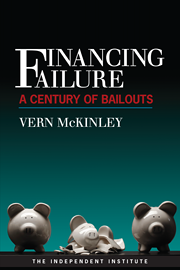During the summer of 2011 Sheila Bair stepped down as chairman of the FDIC and set herself to work on a tell-all book on the financial crisis. Around the time of her departure, Joe Nocera of The New York Times captured her public reputation as someone who stood hard and fast against bailouts, writing that Bair “favored ‘market discipline’ ... over bailouts, which she abhorred.”
Bair’s book, Bull by the Horns: Fighting to Save Main Street from Wall Street and Wall Street from Itself, was released in late September. As part of the promotion of the book she had an interview with The Wall Street Journal during which, consistent with her public reputation, she confided that she “hates bailouts.”
However, a careful study of board minutes, supporting memos, and transcripts of FDIC board meetings during the crisis reveals a different reality. Bair did stand firm against a proposed bailout of Washington Mutual and allowed the bank to fail outright in September 2008 in direct contravention to the wishes of Timothy Geithner, the then-president of the Federal Reserve Bank of New York. But she also led the FDIC board in voting for three too-big-to-fail bailouts of Wachovia, Citigroup, and Bank of America. Consider how she addressed these three in her book.
Wachovia was the initial precedent for the string of FDIC-approved bailouts under what is often called open bank assistance: the FDIC injects funds, provides guarantees or otherwise restructures the bank, and continues to keep it open and operating so it does not fail. In chapter 8 of her book, Bair justifies the September 2008 bailout of Wachovia by blaming one of her fellow regulators, the Office of the Comptroller (OCC). She notes that the OCC was responsible for revoking its charter and closing it when it approached insolvency, but “flatly refused to do so.”
This leaves a key question unanswered. Why did Bair fail to allow the OCC and the Federal Reserve, its two primary federal regulators, to clean up the Wachovia mess? The FDIC was a secondary regulator and under no obligation to swoop in and bail out Wachovia, especially given that the top bidder for the remnants was Citigroup.
Throughout Bull by the Horns, Bair disparages the awful management team at Citigroup, especially its then-chief executive officer, Vikram Pandit. Citigroup had its own problems and it was not at all clear that it was financially strong enough to take on Wachovia. It was under a memorandum of understanding, an administrative order from its regulator.
In fact, Citigroup was on the brink of failure only a few weeks after Bair and the FDIC board approved the Wachovia bailout. In chapter 10 of her book, Bair blames a subsequent November 2008 Citigroup bailout, the second of the FDIC bailouts, on the vague notion that “we were all fearful of what would happen to an uncontrolled failure of Citigroup.”
Bair and the FDIC, however, undertook almost no analysis of how this uncontrolled failure would play out: “We were told by the New York Fed that problems would occur in the global markets if Citi were to fail,” Bair explained. “We didn’t have our own information to verify this statement, so I didn’t want to dispute that with them.” This is curious because a few pages before Bair discusses the Citigroup bailout in her book, she notes that “the lack of hard analysis showing the necessity of [the bailouts] troubles me to this day.”
For Bank of America, bailed out in January 2009, Bair largely blames herself for leading her board in voting affirmative: “In retrospect, I wish I had kept the FDIC out of that unnecessary bailout.”
So contrary to her claims and reputation, Bair did not stand in the way of the bailouts. Rather, she was a powerful and strategic enabler who allowed many bailouts to go forward.
Bull by the Horns and other books are changing the narrative from “We saved Main Street from Wall Street and Wall Street from itself” to “We thought the sky was falling and we panicked; we conducted flawed and hasty analysis; and then we bailed out all the big banks.”
As a result, the big banks are even bigger and just as vulnerable to the next crisis. We will suffer from the long-term consequences of these snap decisions for decades to come.







